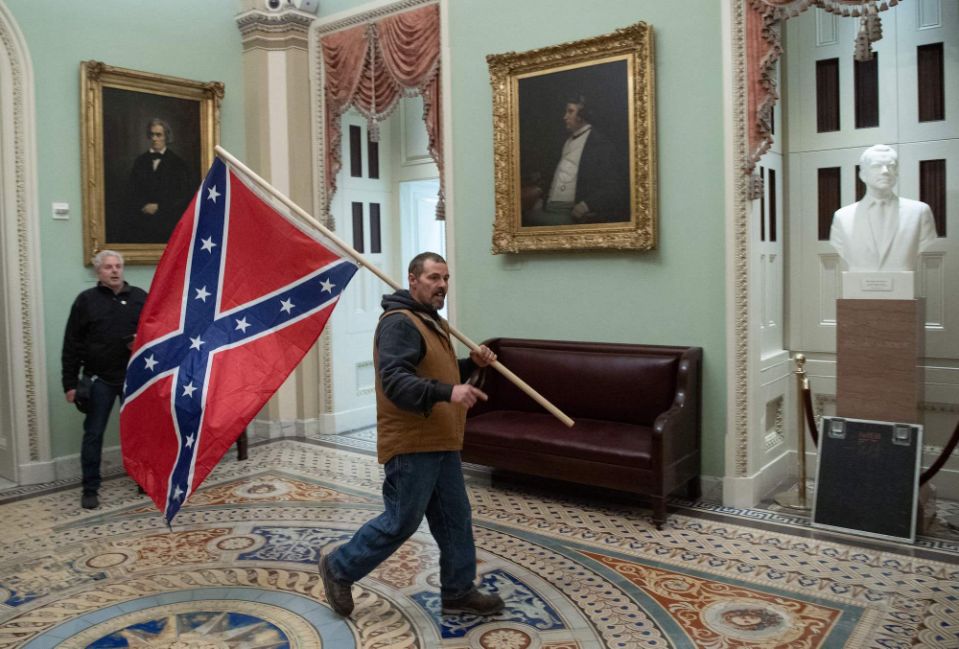Monday Musicale with the Maestro – January 11, 2021 – And I AM Whistling Dixie
On the morning of July 2, 2019, the North Carolina Symphony was rehearsing for a week of Independence Day concerts to be performed around the state. One of the pieces to be played that evening in Wilmington, North Carolina was a work titled American Fantasia. This work by Irish American composer Victor Herbert (best remembered for his operettas Babes in Toyland and The Red Mill) is a potpourri of popular and patriotic songs. Among these are “Columbia the Gem of the Ocean”, Stephen Foster’s “Old Folks at Home” (also known as “Swanee River”), “The Star-Spangled Banner”—and “Dixie.”
During the rehearsal break that morning, after working on American Fantasia, several players expressed to the conductor their deep concern that in 2019, it was no longer acceptable to play “Dixie,” since that song was the unofficial anthem of the Confederate States of America. The players’ worried looks and comments convinced the conductor that it might be wise to remove the song from Herbert’s work. So that night, 30 minutes before the performance, the orchestra’s librarians were seen scurrying around the stage to mark cuts in the orchestral parts deleting “Dixie.” And since that time, this abridged version of Herbert’s piece has been used for all concerts by the NCS.
But this raises a host of difficult questions. Isn’t this an act of musical censorship? Shouldn’t a musical piece be played as printed? Is “Dixie” a racist song? Will it ever achieve “redemption” and be regarded as merely “one of those great American classics”?!

I’m sure that like me, most Americans will be forever haunted by this image from January 6, 2021, when a domestic terrorist brazenly carried this flag through the hallways of our Capitol building, our secular American cathedral of progressive principles. Today this flag represents to most Americans the most shameful era in our history, an era we still are negatively affected by. But it wasn’t always so, even in the aftermath of the Civil Rights era.

From 1979 to 1985, a popular TV show called The Dukes of Hazzard featured a car named “the General (Robert E.) Lee” that had an image of the Confederate flag on its roof.
So far as I’m aware, few voices were raised at that time to offer negative feedback about the image. In the context of that show, the flag seemed to stand for pride in one’s Southern heritage.
A country’s culture is fluid. For instance, Jazz these days is not as popular as it once was. And I remember the late 1970s, when disco was THE pop music of America—then suddenly, it was overtaken by something else, and disco (the best of it, that is) didn’t reappear until 20 years later.
Other changes? I today see TV commercials portraying male and female gay couples. To some people this is abhorrent, while to other’s it’s a sign of the country’s progress towards equality for all. I vividly remember the early 1960s when for the first time, there appeared a TV commercial including Black people. Blacks were 18% of the buying public at that time, but yes, it was a first. Why? Even though I was only eight years old, I was aware that white advertisers didn’t want their products to be “debased” by an image of me next to that pristine bar of Ivory Soap they were selling. Yet that changed. Things change.
My own experience of performing Herbert’s American Fantasia, from the beginning of my career in the mid-1970s, reflects some of these changes. For decades I never thought of deleting “Dixie” from this piece, and neither did anyone suggest that I should consider doing so. But around 1996, I realized that for many there had been a shift in opinion which now associated this song primarily with the poisonous, indeed treasonous issues arising from the Confederacy.
And so I was belatedly “woke” about this. Yet I was confronted with a musical issue I’d encountered in college. During my freshman year at the Oberlin Conservatory, I was shattered when I found out that one of my musical heroes, Richard Wagner, was an anti-Semite. For at least a year, I could not bear to listen to his music. After a while, I reached a compromise: hate the composer; love his compositions. Since then, I have published articles about this topic and have given lectures at Duke University. And on May 14, 2021, I will address the Triangle Wagner Society on this subject. I saw the controversy over “Dixie” as related to my resolution of the Wagner matter. So, in 1996, I resolved that (because I love American Fantasia), I would continue to perform the complete work, but precede it with introductory remarks to prepare the audience—not with some kind of “trigger warning,” but with a wonderful bit of American history. This is something I’ve also shared with DSO players and audiences when we’ve performed it.
On April 9, 1865, the Confederate General Robert E. Lee surrendered the Confederate Army to the Union Army of General Ulysses Grant. Though there were a few more skirmishes, this was the end of the Civil War. The next night, President Abraham Lincoln was in the White House when he saw that hundreds of people had gathered outside his second-floor balcony in the hope he would give an impromptu victory speech. Lincoln was very cautious about giving extemporaneous remarks. Just as our politicians today, he knew he had to weigh each word very carefully for fear of being misunderstood. In lieu of a formal oration, he delivered a few brief remarks, all well-received. Then he noticed a band in the crowd and asked the ensemble to favor him and the crowd with a song. Did he request “The Star-Spangled Banner”? “Yankee Doodle”? No. He asked them to play “Dixie.” “DIXIE”??!!
Here is an article that includes his eloquent remarks to the crowd that night.
This is an arrangement for band that may resemble the one that was heard that night.
In preparing for this blog, I listened to at least a dozen versions of “Dixie,” and musically speaking, it was one of the most joyful experiences of recent months! My toes were tapping with every bar during every version. It IS a damn fine tune! As in most songs, the lyrics don’t mean anything to me (which is why so much of Rap is a closed book to me). But I do know a great melody when I hear it.
Here are three versions I enjoyed most.
The first is the original version, with lyrics and music (perhaps) by Dan Emmet. This was the unofficial anthem of the Confederate States of America. Note that the lyrics have nothing to do with slavery, or “The War Between the States,” or “Yankee aggression”.
Until I began my research, I certainly didn’t know that the Union soldiers “appropriated” this melody and gave it different lyrics. And this version DOES refer to “the conflict.”
Here is an orchestral version of “Dixie” performed by Arturo Toscanini and the NBC Symphony as a surprise encore at a concert in Richmond, Virginia in 1950.
In this new era of heightened concern and sensitivity about our cultural past (especially its negative aspects), we have to decide between two approaches: 1) cut-or-cancel or 2) keep, with commentary. The two can be illustrated with a pair of movies which are significant in film history, but have caused us to rethink our cultural past in significant ways. Birth of a Nation is anathema now because it glorifies the Ku Klux Klan, and many have called for it to be banned. The film Gone with the Wind has been handled a different way. While it is certainly guilty of glorifying a culture built on slavery and portraying African American characters in stereotypical ways, this beloved masterpiece of filmmaking (based on an engaging novel with its gritty heroine) offers positive things as well. Should it all be consigned to the junk heap? No—and as I do when performing “Dixie,” Turner Classic Movies now offers an introductory comment about historical context when airing Gone with the Wind. The host explains that it is “an art work of its time,” making clear how certain elements of the film may be jarring to present-day audiences.
This option shows respect both for the work as it was created, and its present-day audience. The best of our culture deserves to be protected and defended, and sometimes that requires a level of civil discourse. Civility and concern for others are virtues we very much need these days in our country.
January 6, 2021
All Americans were stunned by the tragic events in the Capitol building last Wednesday. As I am writing this, dozens of questions have yet to be answered about how this could have happened. And there never will be a perfect resolution of the questions surrounding this event. Conspiracy theories will abound based on our disbelief that “the power of one” can so change the world. We must be patient, objective, and non-partisan over the coming days as we wait to learn more details of last Wednesday’s horrific drama.
But the agonizing question we must all face now is this: How can a country whose public discourse is so riddled with lies and “alternative facts” prosper, let alone survive? We are all aware that politics is “the art of compromise” and that our politicians will, from time to time, shade or evade the truth—sometimes for the greater good of their constituents, but sometimes for themselves. In trying to explain January 6, 2021, I have asked myself two questions about what it is that we should expect from our elected officials. Are they there to adopt positions with which their constituents agree? (After all, that’s why we voted for them.) Or, armed with more facts than many voters, are they there to choose the best option, even if that option is diametrically opposed to what their voters want? (Of course, this might be construed as a betrayal by their most ardent supporters—as flip-flopping or moral equivocation.)
I raise these questions—but today I have no answers.
I do believe, however, that in the aftermath of January 6, 2021 (“a day that will live in infamy”) we were all sobered by the realization that 80 million Biden voters hating 75 million Trump voters—and 75 million Trump voters hating 80 million Biden voters–are 155 million haters too many. As Martin Luther King so perfectly put it, “An eye for an eye leaves everyone blind.” We need that sort of perspective—not knee-jerk reactions on either the left or the right. This was a day of reckoning that can—and must—lead to a better America. As we go forward into a second challenging year in a row, we must open our eyes to our shared humanity. We must disenthrall ourselves from partisan rancor and those politicians who have shamelessly and egregiously lied to us—using journalism, data science, sophisticated propaganda, and social media to do it. To “install” the buttons that can be pushed to make us hate one another.
I keep in mind always the phrase from the conclusion of Abraham Lincoln’s second inaugural address, “With malice toward none, with charity for all”—and THIS he dared say after a civil war where 600,000 people lost their lives. These words were created to begin the healing process for a divided country where ALL had suffered, albeit in different ways.
So we invite you to listen to this recording of Victor Herbert’s American Fantasia, the piece that includes—yes—a version of “Dixie”at 5:55. But the work’s conclusion is “The Star-Spangled Banner,” the national anthem of the UNITED States of America. Let that not be forgotten.
American Fantasia – Christopher Todd Landor
An American Celebration – The Ultimate Patriotic Music Collection
(July 4th – Memorial Day – Labor Day)
Provided to YouTube by The Orchard Enterprises
Released on: 2010-05-12
William Henry Curry
Music Director
Durham Symphony Orchestra
Recording Engineer: Max Wang
Comprehensive Editor (Text): Suzanne Bolt
Copy Editors: Marianne Ward and Tina Biello
Digital Layout and Publication: Tina Biello and Marianne Ward
Celebrating Maestro Curry’s 50 years conducting
& 11 years with the Durham Symphony!

“Monday Musicale with the Maestro” would not be possible without your support!
Thank you for being a important part of the Durham Symphony Orchestra family! We appreciate your sacrifice to help impact our community and wish you all the best in this New Year!
Funding is provided (in part) by the Durham Arts Council’s Annual Arts Fund, the N.C. Arts Council (a division of the Department of Natural and Cultural Resources), and a grant from the Triangle Community Foundation.
m


